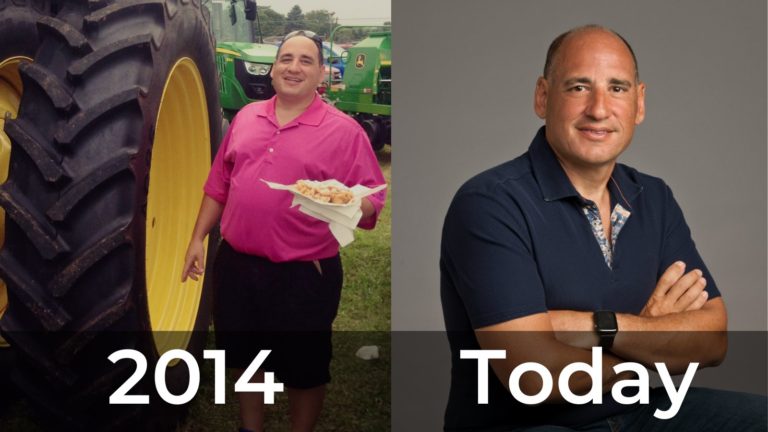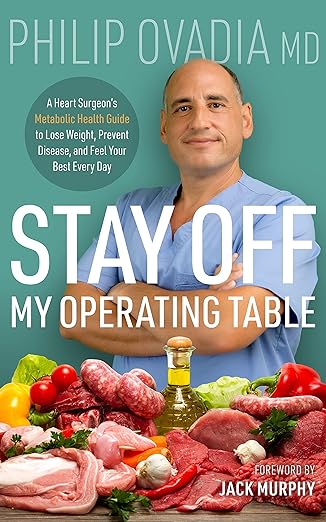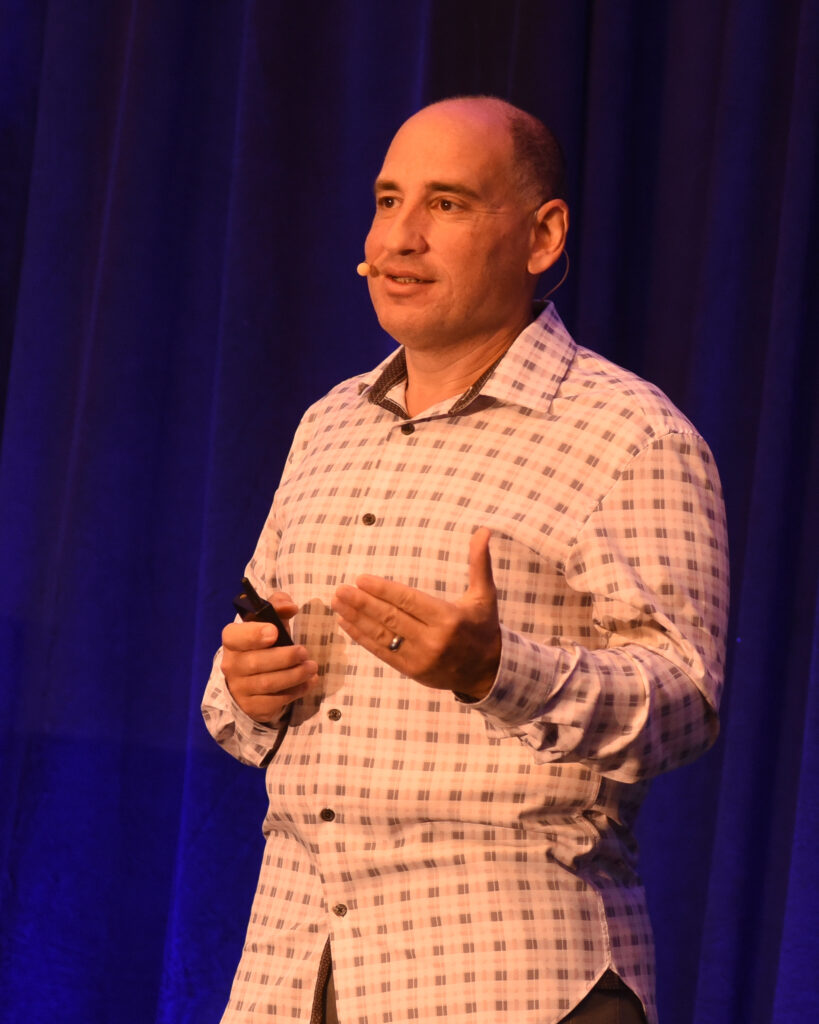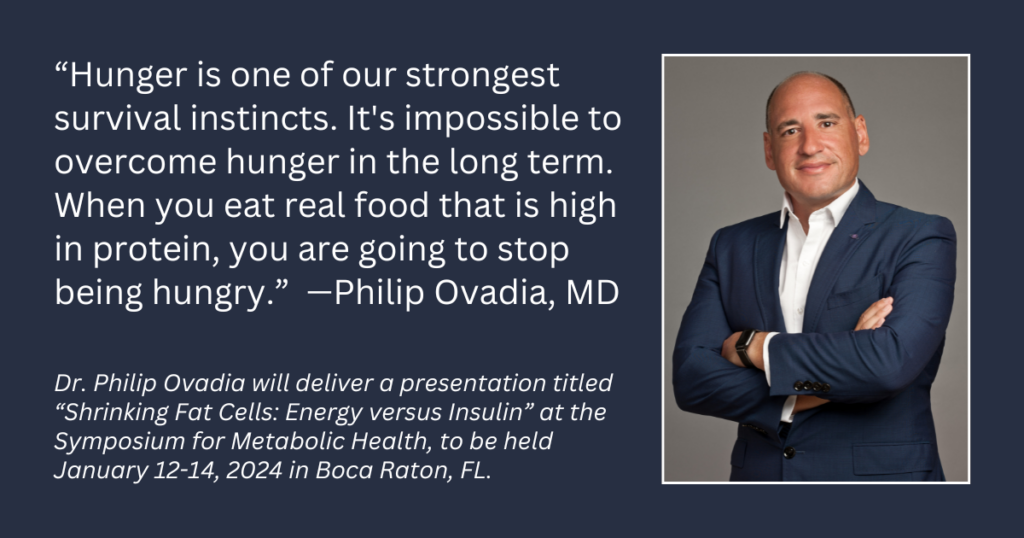‘Stay Off My Operating Table’ Author Dr. Philip Ovadia to Present on Inflammation’s Contribution to Heart Disease at Boca Symposium
LowCarbUSA® is thrilled to announce that Dr. Philip Ovadia, a respected cardiothoracic surgeon and an advocate for dietary and lifestyle changes aimed at improving metabolic health, has been confirmed as an expert presenter at our upcoming Symposium for Metabolic Health in Boca Raton, Florida, from January 11-14, 2024.
His journey from adhering to ineffective nutritional guidelines to becoming a leading voice in metabolic health is not only inspiring but also a testament to the power of informed dietary choices. Dr. Ovadia’s talk, titled “Fanning the Flames, Inflammation’s Contribution to Heart Disease,” promises to shed light on often-overlooked aspects of heart health and the important role of diet in managing and preventing chronic diseases.
Throughout his career and personal life, Dr. Ovadia has confronted and overcome the challenges posed by traditional nutrition advice, which unfortunately led him to temporary solutions and long-term health issues. His personal experience with weight struggles, despite attempting to follow the USDA guidelines and maintaining an active lifestyle, led him to explore the deeper connections between diet, metabolic health, and chronic diseases. This exploration, catalyzed by a significant lifestyle change in 2015, not only transformed his health but also reshaped his professional focus.
At the LowCarbUSA® Symposium, Dr. Ovadia will discuss the critical role of inflammation in heart disease, challenging the conventional cholesterol-centric view of heart health. His insights on the misconceptions in medical education, particularly regarding cholesterol and inflammation, will provide attendees with a fresh perspective on managing heart health. Dr. Ovadia’s approach goes beyond the surface, emphasizing the importance of addressing the root causes of health issues rather than simply managing symptoms.
His presentation will also explore the impact of dietary advice on overall health and the effectiveness of a therapeutic carbohydrate reduction diet in reducing inflammation and improving metabolic health. Dr. Ovadia’s emphasis on practical, sustainable lifestyle advice has the potential to inspire and empower both healthcare professionals and patients alike. His statement, “If you’re given good advice, it becomes easy to implement and follow,” encapsulates his philosophy on the transformative power of proper guidance in achieving long-term health benefits.
From personal transformation to leading health influencer
Dr. Ovadia’s journey to becoming a leading advocate for dietary and lifestyle changes is as compelling as it is inspiring. Growing up in New York, Dr. Ovadia followed the path many health-conscious families did, adhering to USDA guidelines and maintaining an active lifestyle. Despite these efforts, he faced a lifelong struggle with weight, a challenge that persisted through his formative years as a student at Pennsylvania State University, Jefferson Medical College, and even during his residency in General Surgery and Fellowship in Cardiothoracic Surgery at prestigious institutions.

Reflecting on his journey, Dr. Ovadia remarked, “I did everything right – but I was still fat.” This statement encapsulates the frustration and confusion he experienced while following traditional health advice that ultimately proved ineffective for him. His personal battle with weight continued unabated, leading to a life-changing episode at the age of 27, when a severe heartburn incident, mistaken for a heart attack, spurred him into action. Despite losing 50 pounds through rigorous diet and exercise, the weight returned, reinforcing his belief in a genetic predisposition to obesity.
Dr. Ovadia’s pivotal moment came in 2015, catalyzed by his supportive decision to join his wife in a gluten-free diet. This shift brought about an immediate improvement in his well being and sparked a deeper exploration into the role of diet in health. His encounter with Gary Taubes at a medical conference further illuminated the impact of sugar and carbohydrates on obesity, leading him to adopt a low-carbohydrate lifestyle. “This one decision changed my life,” Dr. Ovadia shared, highlighting the profound impact of his dietary shift. He’s now helping others achieve the same through his work and advocacy.
Fanning the Flames
In a recent conversation, Dr. Phil Ovadia spoke with us extensively about the critical role of inflammation in heart disease and the misconceptions surrounding diet and heart health. He discussed the historical and current perspectives on the relationship between inflammation and atherosclerotic heart disease,and he explained the intricate interplay between inflammation and cholesterol, and how this affects the development of heart conditions. One of the more intriguing aspects of our talk was his views on the connection between low-carbohydrate diets, red meat consumption, and inflammation.
“The medical community has been poorly educated on this,” he said “We have focused on cholesterol at the expense of taking into account the role that inflammation has played in this process.” He believes there is a great need for a broader understanding of heart disease beyond the conventional cholesterol-centric view.
Dr. Ovadia also addressed common misconceptions about meat consumption and its health implications. He argues that significant progress in combating obesity and metabolic diseases could be achieved by reducing processed food intake and emphasizing whole, unprocessed foods. This shift, he suggests, can positively impact numerous health areas.
“The same things that help minimize your chances of heart disease also lower your risk of diabetes, high blood pressure, many forms of cancer, chronic kidney disease, auto-immune conditions,” Dr. Ovadia said.
Challenging the ‘Eat Less’ Mantra
Dr. Ovadia also tackled the often misunderstood subject of dietary advice and its impact on health. He criticized the prevalent ‘eat less’ advice, noting its ineffectiveness due to its restrictive nature and tendency to increase hunger. “Hunger is one of our strongest survival instincts… it’s impossible to overcome hunger in the long term,” he explained, advocating for a more nuanced approach focused on reducing consumption of processed foods rather than overall food intake.
Highlighting the importance of dietary quality, Dr. Ovadia added, “When you eat real food that is high in protein, you are going to stop being hungry.” This insight underscores the significance of protein in providing essential nutrients and amino acids, crucial for maintaining satiety and supporting overall health.
Dr. Ovadia’s personal journey and professional experiences have led him to advocate for better lifestyle advice in medical practice. He believes that when practitioners provide actionable, effective lifestyle guidance, both they and their patients will see significant health improvements. “If you’re given good advice, it becomes easy to implement and follow. When you actually receive good lifestyle advice, it is a very powerful tool,” Dr. Ovadia said.
Dr. Ovadia stressed the importance of eliminating the fear and concern around constant hunger and restriction. He shared, “When I realized that I could both be not hungry and also be seeing improvement, that really flipped the switch for me.”
Dr. Ovadia expressed optimism for patients who find practitioners offering the right advice. He observed high success rates among those willing to try new ideas with proper support. “It’s rare that I see someone make no progress, and the better that we can support that patient, the higher those chances of real long-term success,” he said.
Dr. Ovadia mentioned the limitations of the traditional insurance-supported healthcare model in addressing lifestyle interventions, advocating for a more comprehensive approach. “The traditional health care insurance model just doesn’t take support systems into account,” he explained, highlighting the need for a paradigm shift in health management.
Reflecting on his personal health journey, Dr. Ovadia shared the dramatic improvements he experienced after switching to a low-carb diet and losing 100 pounds. “There really is no comparison,” he said. “I truly do feel the best of my life. I had nowhere near the energy that I do today,” he said.
 Stay Off My Operating Table
Stay Off My Operating Table
In his book, “Stay Off My Operating Table,” Dr. Ovadia delivers an actionable guide that challenges conventional wisdom on diet and health. Dr. OVadia calls attention to the alarming fact that 88% of adults are metabolically unhealthy and heart disease is more prevalent than ever. Dr. Ovadia’s critiques the mainstream approach to dieting and health management, which often leads to temporary weight loss and long-term frustration. The book is a revelation of the failings of popular diets and the healthcare industry’s focus on symptom management rather than disease prevention.
Drawing from his personal journey of overcoming morbid obesity and his professional experience as a heart surgeon, Dr. Ovadia underscores the importance of metabolic health. He explains how the majority of leading causes of death, including heart disease, are rooted in metabolic disease. He offers practical advice on how to achieve a nutritionally complete diet, the benefits of light exercises over strenuous workouts, and how to maintain metabolic health across various diet plans, from carnivore to vegan.
Dr. Ovadia’s approach is about sustainability and long-term health, contrasting sharply with the quick-fix solutions that dominate the market. “I tried to keep it simple and practical,” he said, “and based on the feedback we’ve had, along with the success of the book, I think we accomplished that.”
The Symposium’s Role in Dr. Ovadia’s Metabolic Health Journey
Dr. Phil Ovadia’s transition from a successful heart surgeon to a renowned metabolic health expert and influential author is a journey deeply intertwined with his experiences at the Symposium for Metabolic Health. This event played a pivotal role in his professional transformation, offering insights and perspectives that reshaped his approach to health care. Dr. Ovadia attended the Symposium for Metabolic Health in Boca in 2019 and 2020, before launching Ovadia Heart Health in late 2020.
Dr. Ovadia credits the symposium for its unique environment that fosters interaction between practitioners and non-practitioners alike. “Attending the Symposium for Metabolic Health conferences had a dual impact on me,” he explained. “It reinforced my personal journey and opened my eyes to the need for this approach in my professional life.”

This realization was crucial in Dr. Ovadia’s decision to integrate metabolic health more deeply into his practice, shifting his focus from solely performing heart surgeries to also preventing them through dietary and lifestyle changes.
The symposium not only provided Dr. Ovadia with a platform to share and gain knowledge but also connected him with a community that supported his professional growth. “The network and resources available through Low Carb USA, and the Society of Metabolic Health Practitioners have been invaluable,” Dr. Ovadia stated, emphasizing the strength that comes from a community united in a common mission. He highlighted the importance of educational platforms and certification pathways that assist practitioners in embracing metabolic health in their roles.
Dr. Ovadia passionately advocates for the benefits of attending such events, noting the unique opportunity they present for direct interaction and engagement. “These conferences offer a chance to be in the room, interact, and ask questions – a stark contrast to traditional medical conferences,” he said.
Encouraging others to attend, Dr. Ovadia said, “It’s a very unique opportunity that shouldn’t be missed. Whether you’re a healthcare professional or someone interested in personal health, the symposium offers invaluable insights and connections.”
Register for the 2024 Boca Symposium
The 2024 Boca Symposium will present an extensive program covering a broad spectrum of metabolic therapy topics. This includes sessions on carbohydrate reduction strategies for, and research in, type 2 diabetes, fatty liver, obesity, cardiovascular disease, neurological disorders, as well as mental health conditions, and so much more, offering groundbreaking insights into contemporary treatment modalities.
In addition to these much anticipated presentations the 2024 Boca Symposium will serve as a critical event for the Type 1 diabetes community, attracting both patients and medical professionals. It features a specially curated workshop for practitioners scheduled for Thursday, January 11th (RSVP required) with a comprehensive day dedicated to type 1 diabetes discussions on Friday, January 12th.
Learn more about the Symposium for Metabolic Health in Boca Raton, FL, January 11-14.



